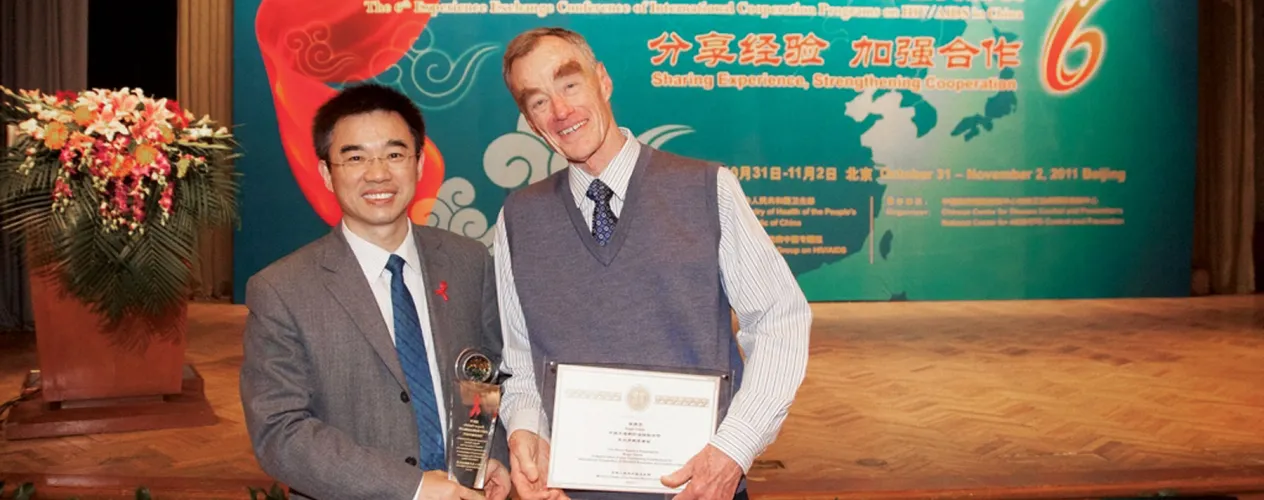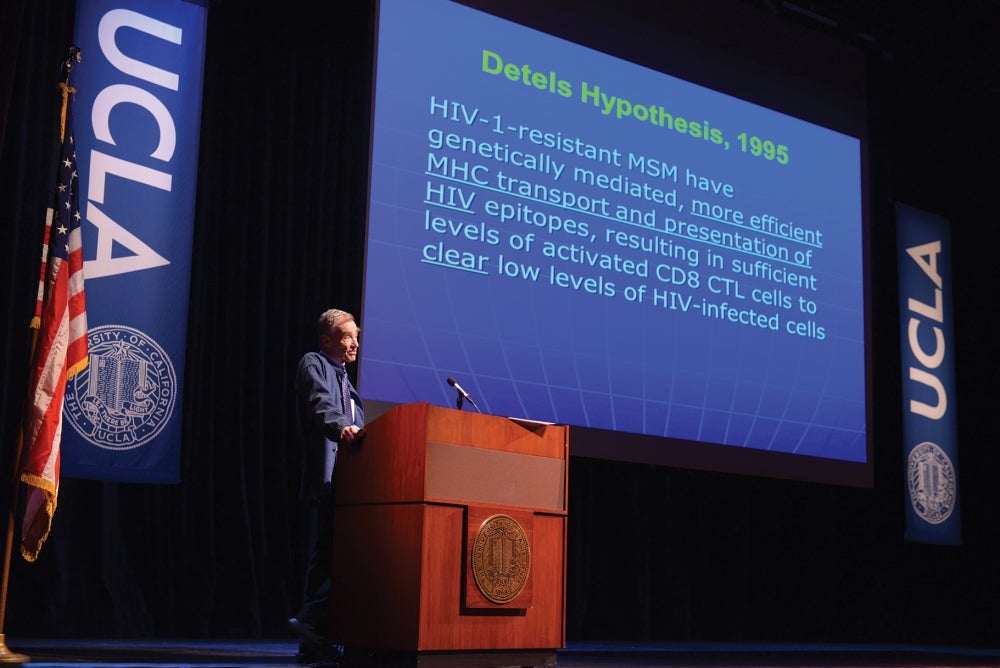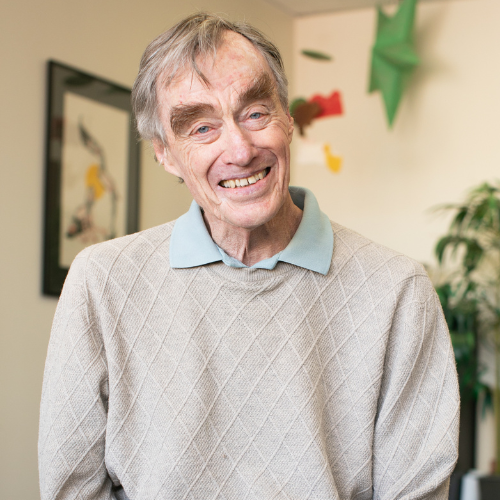Network of Admirers
After leading pioneering research on the unfolding HIV/AIDS epidemic in the U.S., Dr. Roger Detels went on to train scores of HIV/AIDS leaders in Asia who remain in close contact with one another and their mentor.

IN CHINA AND ACROSS SOUTHEAST ASIA, an informal Fielding School alumni network thrives — public health leaders, many of them veterans of the earliest days of fighting the HIV/ AIDS epidemic, whose actions and insights helped to save countless lives. The group includes individuals who have held high-ranking government positions, including two ministers of health; the founders of two public health schools, as well as deans and professors of others; the current or former leaders of many of the HIV/AIDS prevention and control programs in the region; and researchers whose findings have profoundly influenced national policies. Many have expanded their portfolios to address other public health challenges, but they continue to collaborate and consult with one another, and with their former teacher.
Dr. Detels’ trainees have played a significant role in changing the course of the HIV epidemic in Asian countries.
(MPH ’92, PhD ’95)
Dr. Roger Detels, professor of epidemiology at the Fielding School and founding director of the UCLA/Fogarty AIDS International Training and Research Program — through which more than 100 of these public health leaders received FSPH master’s or doctoral degrees and many more benefited from short-term training — speaks with the affection of a proud parent about his network of protégés, the legacy they have built, and how that has reflected on the school whose faculty he joined nearly a half-century ago. “We have attained a reputation in that region for excellence in public health,” Detels says.
By the time he established the UCLA/Fogarty program in 1988, Detels was already well known as a leader of one of the earliest and most important studies of HIV/AIDS in the United States. The Multicenter AIDS Cohort Study (MACS) was launched at four sites in 1984 before it was even known that the disease had a viral origin. Detels continues to head the Los Angeles site of MACS, which has followed approximately 2,000 gay and bisexual men since the dawn of the epidemic.
His retirement this year, effective in June, will not stop Detels from continuing his work on MACS, which was just extended for another seven years by the National Institute of Allergy and Infectious Diseases. In fact, Detels remains busy as ever, working on the seventh edition of the Oxford Textbook of Global Public Health, an encyclopedic overview of the field presented in three volumes and more than 1,000 pages. Detels was co-editor of the first two editions and has been senior editor of each one since.

It’s been a monumental career, particularly for someone who admits, with characteristic modesty: “I was totally awed by science and research right up through medical school.”
Detels had entered medical school intending to become a practicing physician, but was introduced to the field of epidemiology during a six-month elective period at the Naval Medical Research Unit in Taipei, Taiwan. “I realized from that experience that seeing one patient at a time didn’t have anywhere near the impact I could have going into public health research,” he says.
After three years as an epidemiologist in Taipei and two at the National Institute of Neurologic Diseases and Stroke, he joined the Fielding School faculty in 1971 and began applying his skills to wide-ranging health concerns, including hypertension, air pollution, multiple sclerosis and infectious diseases.
In 1981, UCLA physician Michael Gottlieb reported the first cases of a new disease affecting men who had sex with men. Detels, who had developed an interest in immunology through his studies of multiple sclerosis, worked with UCLA’s Gay and Lesbian Association to recruit members for a study in which anonymous participants would fill out a questionnaire and take a blood test to measure their immune cells.
“I quickly realized that to be effective, I had to follow these individuals over time, so when I called them with the results I said we need to do a follow-up study, and to do that I would need your name and a way to contact you, potentially for years,” Detels recalls. “This was the early 1980s. There was a high level of stigma against gay men, exacerbated to a huge extent by the appearance of this disease. These young men were scared, and their natural inclination was to stay below the radar. Yet, of the 200 students who participated in the original study, approximately 185 agreed to be followed over time. That was a colossal act of heroism in my opinion.”
The cohort evolved into MACS, with UCLA, under Detels’ leadership, running the largest site. MACS contributed some of the earliest evidence of the route of infection and risk activities for HIV transmission, along with the changes in the immune system in response to the virus. Detels also published a landmark study showing that some men were resistant to HIV infection. Since the advent of effective treatment, MACS has focused on the genetic impact of the therapy, and on the susceptibility of HIV-positive individuals to other infections.
Detels launched the UCLA/Fogarty program, focusing on China and Southeast Asia, to build the leadership capacity of overseas institutions to fight the then-unfolding crisis by preparing trainees in state-of-the-art epidemiologic techniques and research methods. As the program began, the participating nations were grappling with some of the first reports of rapidly spreading HIV. In addition to the degree training offered at the Fielding School, Detels frequently traveled abroad to offer short-term trainings at collaborating institutions. While there, he often consulted with public officials, and assisted the governments of Thailand, Myanmar, the Philippines and Indonesia in the development of their systems to track the epidemic.
Many of Detels’ trainees played pivotal roles in fighting the epidemic. Dr. Zunyou Wu (MPH ’92, PhD ’95) collaborated with his mentor to provide the first reports of an HIV outbreak among plasma donors in China — a revelation that led China’s Ministry of Health to shut down all commercial plasma centers. Wu and Detels have gone on to collaborate on more than a dozen studies. “Dr. Detels’ trainees have played a significant role in changing the course of the HIV epidemic in Asian countries,” says Wu, currently the chief epidemiologist for the Chinese Center for Disease Control and Prevention, as well as an adjunct professor of epidemiology at the Fielding School. “Dr. Detels taught me not only about academics, but also the importance of hard work and integrity.”
Detels’ career highlights include five years as the Fielding School’s dean (1980-85), a slew of national and international leadership positions within the field of epidemiology, and numerous honors, including awards from the governments of Thailand, Cambodia, Vietnam and China. But he doesn’thesitate when asked to name the most rewarding aspect of his career.
“It has to be the students and colleagues with whom I’ve worked over the years,” Detels says. “Many have been from places with poor conditions or corrupt political systems, but they continue to be incredibly devoted to improving public health. Getting to know them has been an extraordinary experience."
